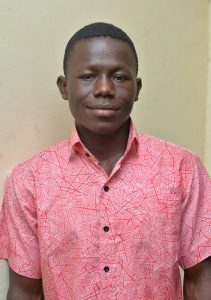Blessmond Alebna Ayinbire, from Ghana, was shortlisted for the Babishai Haiku 2016 prize. He is evocative and imaginative, giving hilarious and thought-provoking insights into his Haiku journey.
How do you define haiku?
I define haiku as a play verse form of poetry devoid of poetic steroids, which captures a clear picture of a memorable moment in nature.
What is the writing process of a haiku like?
Writing haiku is so thrilling that haiku has become my true love. It reveals to you, the world in a totally new and clearer picture as you drown into nature to capture it in words. Haiku is a cousin to photography. The subject strikes the writer, like it does the photographer. Then, you expose your writing pad or your brain and let your ink or feeling make a copy of the subject on it.
Were your surprised at being shortlisted?
[Smiles] Yes I was surprised, although I was expecting it. One, because I sent three haiku and one had an obvious spelling error. So I lost hope. The second thing is, I have read a lot of Afriku (African haiku) and have seen the great talents African haijins have. So I didn’t believe that my experimental results would stand those written by people who have mastered the aesthetics of the art.
Have you read the Mamba Journal, a Haiku publication of the African Haiku Network?
Yes I have. Mr Adjei Agyei-Baah’s Facebook page was where I first chanced on this treasure. Through Facebook, I found other sources like The Living Haiku Anthology, Haiku Society of America, Ghana Haiku Society, kukai (haiku contest) results and the list goes on and on.
Which African haiku writers do you admire?
It’s crystal clear I admire the most astute African haiku writer, Adjei Agyei-Baah. I love his Saijiki (season words). Emmanuel Jessie Kalusian, Celestine Nudanu and Ali Znaidi are also my favourites.
Parting remarks?
The Babishaiku award is a bold step in the direction of promoting African haiku. Contests bring out talents and beckons the eyes of the world towards them. Also, forming national and regional haiku societies will help nurse talents in the art. In this age of technology, African haiku would just be a click away from anyone in any corner of the planet, if we breath life into it. I also want to congratulate my co-shortlistees and wish us all the best of luck. Also, I want use this opportunity to applaud the Babishai team and all African haiku writers for how far they have brought the art.
Thank you Blessmond.
The #Babishai2016 Poetry festival runs from 24th to 26th August in Kampala at Maria’s Place in Ntinda, near Victory City Church.


